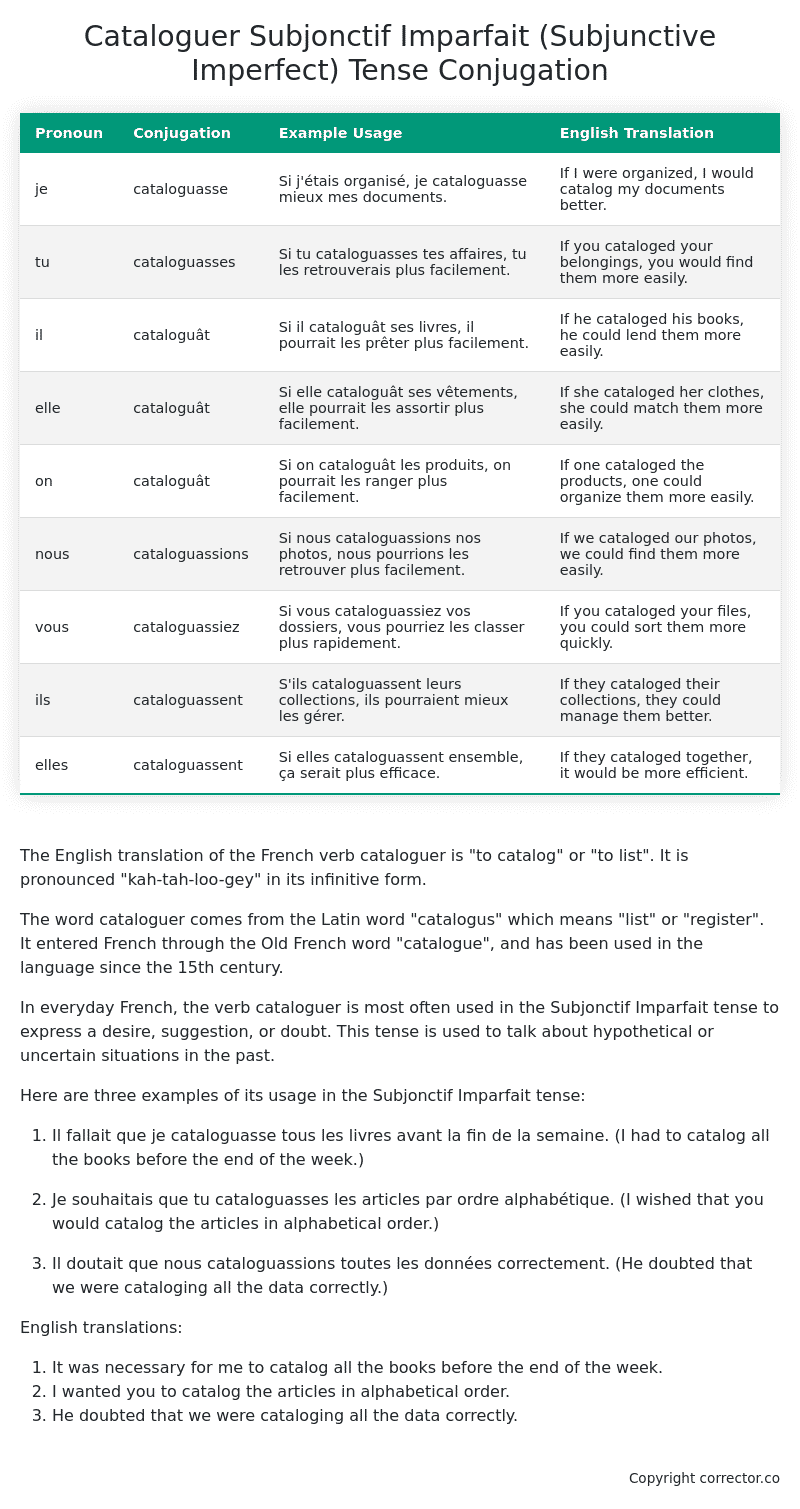Subjonctif Imparfait (Subjunctive Imperfect) Tense Conjugation of the French Verb cataloguer
Introduction to the verb cataloguer
The English translation of the French verb cataloguer is “to catalog” or “to list”. It is pronounced “kah-tah-loo-gey” in its infinitive form.
The word cataloguer comes from the Latin word “catalogus” which means “list” or “register”. It entered French through the Old French word “catalogue”, and has been used in the language since the 15th century.
In everyday French, the verb cataloguer is most often used in the Subjonctif Imparfait tense to express a desire, suggestion, or doubt. This tense is used to talk about hypothetical or uncertain situations in the past.
Here are three examples of its usage in the Subjonctif Imparfait tense:
-
Il fallait que je cataloguasse tous les livres avant la fin de la semaine. (I had to catalog all the books before the end of the week.)
-
Je souhaitais que tu cataloguasses les articles par ordre alphabétique. (I wished that you would catalog the articles in alphabetical order.)
-
Il doutait que nous cataloguassions toutes les données correctement. (He doubted that we were cataloging all the data correctly.)
English translations:
- It was necessary for me to catalog all the books before the end of the week.
- I wanted you to catalog the articles in alphabetical order.
- He doubted that we were cataloging all the data correctly.
Table of the Subjonctif Imparfait (Subjunctive Imperfect) Tense Conjugation of cataloguer
| Pronoun | Conjugation | Example Usage | English Translation |
|---|---|---|---|
| je | cataloguasse | Si j’étais organisé, je cataloguasse mieux mes documents. | If I were organized, I would catalog my documents better. |
| tu | cataloguasses | Si tu cataloguasses tes affaires, tu les retrouverais plus facilement. | If you cataloged your belongings, you would find them more easily. |
| il | cataloguât | Si il cataloguât ses livres, il pourrait les prêter plus facilement. | If he cataloged his books, he could lend them more easily. |
| elle | cataloguât | Si elle cataloguât ses vêtements, elle pourrait les assortir plus facilement. | If she cataloged her clothes, she could match them more easily. |
| on | cataloguât | Si on cataloguât les produits, on pourrait les ranger plus facilement. | If one cataloged the products, one could organize them more easily. |
| nous | cataloguassions | Si nous cataloguassions nos photos, nous pourrions les retrouver plus facilement. | If we cataloged our photos, we could find them more easily. |
| vous | cataloguassiez | Si vous cataloguassiez vos dossiers, vous pourriez les classer plus rapidement. | If you cataloged your files, you could sort them more quickly. |
| ils | cataloguassent | S’ils cataloguassent leurs collections, ils pourraient mieux les gérer. | If they cataloged their collections, they could manage them better. |
| elles | cataloguassent | Si elles cataloguassent ensemble, ça serait plus efficace. | If they cataloged together, it would be more efficient. |
Other Conjugations for Cataloguer.
Le Present (Present Tense) Conjugation of the French Verb cataloguer
Imparfait (Imperfect) Tense Conjugation of the French Verb cataloguer
Passé Simple (Simple Past) Tense Conjugation of the French Verb cataloguer
Passé Composé (Present Perfect) Tense Conjugation of the French Verb cataloguer
Futur Simple (Simple Future) Tense Conjugation of the French Verb cataloguer
Futur Proche (Near Future) Tense Conjugation of the French Verb cataloguer
Plus-que-parfait (Pluperfect) Tense Conjugation of the French Verb cataloguer
Passé Antérieur (Past Anterior) Tense Conjugation of the French Verb cataloguer
Futur Antérieur (Future Anterior) Tense Conjugation of the French Verb cataloguer
Subjonctif Présent (Subjunctive Present) Tense Conjugation of the French Verb cataloguer
Subjonctif Passé (Subjunctive Past) Tense Conjugation of the French Verb cataloguer
Subjonctif Imparfait (Subjunctive Imperfect) Tense Conjugation of the French Verb cataloguer (this article)
Subjonctif Plus-que-parfait (Subjunctive Pluperfect) Tense Conjugation of the French Verb cataloguer
Conditionnel Présent (Conditional Present) Tense Conjugation of the French Verb cataloguer
Conditionnel Passé (Conditional Past) Tense Conjugation of the French Verb cataloguer
L’impératif Présent (Imperative Present) Tense Conjugation of the French Verb cataloguer
L’infinitif Présent (Infinitive Present) Tense Conjugation of the French Verb cataloguer
Struggling with French verbs or the language in general? Why not use our free French Grammar Checker – no registration required!
Get a FREE Download Study Sheet of this Conjugation 🔥
Simply right click the image below, click “save image” and get your free reference for the cataloguer Subjonctif Imparfait tense conjugation!

Cataloguer – About the French Subjonctif Imparfait (Subjunctive Imperfect) Tense
Formation
Common Everyday Usage Patterns
Interactions with Other Tenses
Subjonctif Présent
Indicatif Passé Composé
Conditional
Conditional Perfect
Summary
I hope you enjoyed this article on the verb cataloguer. Still in a learning mood? Check out another TOTALLY random French verb conjugation!


